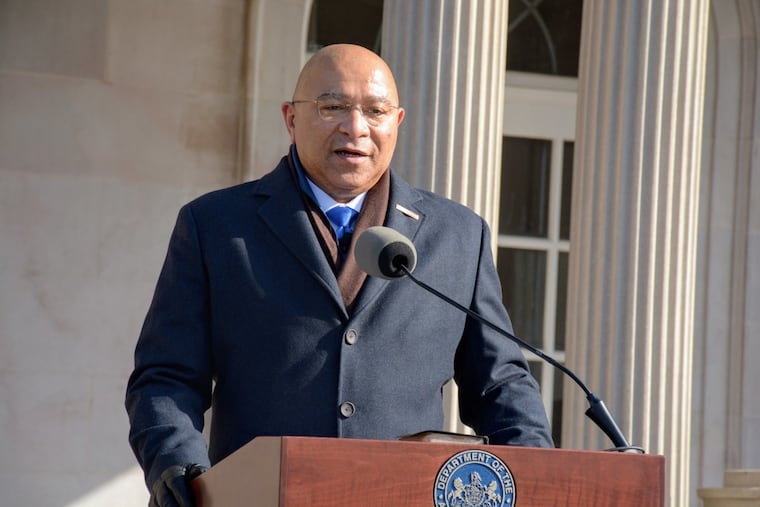Pa. auditor general accused Philly-area school districts of a ‘shell game’ to raise taxes
School officials pushed back, saying that districts were acting responsibly in setting funds aside to cover mounting expenses beyond their control.

Pennsylvania’s auditor general on Wednesday said that a dozen school districts, including five in the Philadelphia suburbs, have been shifting money in their budgets to raise taxes above a state limit without having to gain voter approval first.
“Basically, it’s a shell game,” Auditor General Timothy DeFoor said of the practice, which he said had been used by all 12 districts recently audited by his office, including Abington, Lower Merion, and North Penn in Montgomery County; West Chester Area in Chester County; and Neshaminy in Bucks County. The districts were chosen based on the size of their fund balances and the last time they were audited, according to DeFoor.
The districts, which were audited for the fiscal years ending 2018 through 2021, had all sought exceptions to the Act 1 index, a state-imposed limit on property tax increases. School districts can ask the Pennsylvania Department of Education for permission to raise taxes above the index — which is tied to inflation and changes annually — due to specific cost pressures, including increases in special education costs or mandated contributions to the state pension system. They have to show they wouldn’t be able to afford the costs without the tax increase.
The audited districts moved unspent money out of their general funds into reserves to be eligible for the exceptions, DeFoor said. He said the practice wasn’t illegal but lacked transparency: If districts don’t get an Act 1 exception from the state, they must hold a referendum to raise taxes above the threshold.
Instead, “the unused money sits in the bank for a rainy day that may never come,” DeFoor said during a news conference in Harrisburg. “And taxpayers never get the opportunity to vote on a tax increase.”
DeFoor said the 12 districts audited represented a cross section of urban, rural, and suburban communities. “If this is the standard operating procedure ... it’s not a stretch to say” that it may be happening throughout Pennsylvania, he said.
School officials pushed back, saying that districts were acting responsibly in setting funds aside to cover mounting expenses beyond their control.
“Having a fund balance is essential for prudent financial operations of any school district,” said the Pennsylvania Association of School Business Officials, which noted that districts were putting money into funds to cover pension contributions, special education expenses, and charter school tuition — three areas where districts are facing rising costs and are restricted from cutting back.
Most school districts also aren’t raising taxes above the Act 1 index, even if they apply for exceptions to it, according to the business officials’ association: Just seven of Pennsylvania’s 500 districts did so in 2021-22, it said.
“Second-guessing the decisions of locally elected officials who are carefully planning to be able to maintain their educational programs in the face of increasing mandated costs, decreasing revenues, global pandemics, healthcare increases, or even late or uncertain budgets due to new legislative dynamics is simply counter to sound financial practice,” the association said.
In the West Chester Area School District, John Scully, the director of business affairs, said DeFoor hadn’t properly characterized the district’s budgeting practices. Scully said he had transferred money from the district’s general fund to a capital fund, but that money was spent in the same year on technology and infrastructure improvements.
“I do not at year-end transfer money out to qualify” for the tax exception, Scully said. He said that West Chester had received permission to raise taxes over the Act 1 limit in both 2017-18 and 2018-19 due to rising special education costs, but imposed lesser increases than it had been approved for — raising taxes 2.9% in the first year, when the index was 2.4%, and 2.8% the next, when the index was 2.3%.
West Chester noted that it had received Moody’s highest credit rating, while the North Penn School District also touted a high credit rating — assessments of districts’ financial health that mean lower borrowing rates.
“I am disappointed to hear the misleading rhetoric regarding this report,” North Penn Superintendent Todd Bauer said in a statement. He said North Penn had only actually used an Act 1 exception once in the last 10 years, to “support our special education programs.”
The Lower Merion School District said in a statement that the school board had opted to not seek an exception to the Act 1 index this year, marking the seventh year in a row that taxes would not be raised over the limit. (It applied for one exception during the audit period due to pension costs, it said, but didn’t ultimately use it.)
The district said it “continues to use accounting and budgeting practices that are standard for school districts across the Commonwealth,” adding that some of DeFoor’s recommendations were already in place or irrelevant given Lower Merion’s recent agreement to return $27 million to taxpayers to settle a lawsuit over property tax increases.
DeFoor, a Republican elected in 2020, called on lawmakers to close “loopholes” that he said were enabling districts to shift money without it counting toward the calculation of Act 1 exceptions. He also suggested a possible shift in school district fiscal years, which currently start on July 1, so that districts wouldn’t have to finalize their budgets without knowing how much money they’ll be receiving from the state.
The business officials’ association called for additional analysis before changing any policies “based on a review of only 12 school districts.”